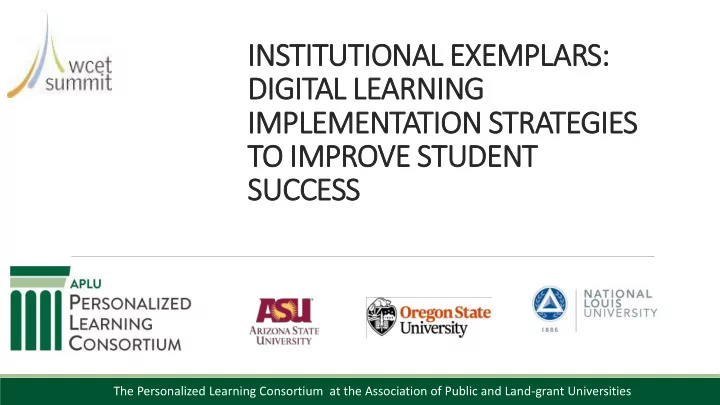

INSTITUTIONAL EXEMPLARS: DIGITAL LEARNING IMPLEMENTATION STRATEGIES TO IMPROVE STUDENT SUCCESS The Personalized Learning Consortium at the Association of Public and Land-grant Universities
Panelists: Fred Corey, Vice Provost for Undergraduate Education, Arizona State University Julie Greenwood, Associate Provost, Transformative Learning, Oregon State University Jon Oelke, Assistant Professor, Wheeling Campus Academic Lead, and Psychology Content Lead Pathways Program, National Louis University (IL) Moderator: Karen Vignare, Executive Director, PLC@APLU 2018 THE PERSONALIZED LEARNING CONSORTIUM AT APLU
Lower Income Students College Graduation Rates Have Consistently Lagged Higher Income Students http://www.pellinstitute.org/downloads/publications- Indicators_of_Higher_Education_Equity_in_the_US_2016_Historical_Trend_Report.pdf 3 2018 THE PERSONALIZED LEARNING CONSORTIUM AT APLU
College Graduation Rates For Black and Hispanic Students Continue to be Lower than Others 2018 THE PERSONALIZED LEARNING CONSORTIUM AT APLU
Early Results: Adaptive Courseware used as part of an Active Learning course is improving course outcomes and Lowering achievement gaps 2018 THE PERSONALIZED LEARNING CONSORTIUM AT APLU
ALL HANDS ON DECK: ADAPTIVE LEARNING TRANSFORMATION AT OSU ACADEMIC PROGRAMS & LEARNING INNOVATION | TRANSFORMATIVE LEARNING
Adaptive Learning Ecosystem: Pathways requiring algebra reasoning Potential Impact: 15 Courses 20,425 Students 28% of Gen Ed Enrollment ACADEMIC PROGRAMS & LEARNING INNOVATION | TRANSFORMATIVE LEARNING
Adaptive Learning Initiative as a Mechanism for Course Transformation Faculty & Department Active Course Learning Structure Sustainable Course Adaptive Transformation Faculty Learning Class Size Roles Project ACADEMIC PROGRAMS & LEARNING INNOVATION | TRANSFORMATIVE LEARNING
Promising Early Results in Math & Psychology • Withdraw rates cut in half Algebra • Double-digit decreases in DFWU* rates • 23% decrease in DFWU rate for Ecampus • Historic DFWU rate of 26% General • DFWU rates range 2-10% for the redesigned Psychology course (which includes many changes in addition to adaptive learning) *DFWU Rate includes course withdraws as well as grades of D, F, or Unsatisfactory received ACADEMIC PROGRAMS & LEARNING INNOVATION | TRANSFORMATIVE LEARNING
Positive Student Experience Pre-term, mid-term, & post-term student surveys measuring motivation, learning approach, satisfaction, and perceived value. I have become much more confident in doing math. I still make mistakes, but I can catch The OSU Math Department and correct them. has really stepped up their game when it comes to the format and learning tools! I got a deeper understanding of mathematical topics that I had struggled with in the past. This class was engaging, interactive, and educational. ACADEMIC PROGRAMS & LEARNING INNOVATION | TRANSFORMATIVE LEARNING
Undergraduate College Summary May 2018
STUDENT DEMOGRAPHICS CONT. 12 Expected Family Contribution (EFC), by Student Level Race/Ethnicity $0 EFC $1 - $5K EFC $5K - $10K EFC >10K EFC Undocumented African American Hispanic Other 100% 100% 80% 73.7% 80% 70.5% 68.6% 62.5% 62.8% 61.0% 58.9% 60% 53.5% 60% 41.9% 40% 40% 23.2% 20.7% 21.2% 18.6% 26.1% 23.5% 20% 11.6% 19.8% 8.9% 7.2% 7.0% 7.2% 6.2% 5.8% 4.9% 3.4% 4.0% 4.0% 20% 0.0% 6.5% 6.1% 5.3% 4.7% 0% 0% Freshmen Sophomores Juniors All Freshmen Sophomores Juniors All (n=506) (n=226) (n=43) (n=775) (n=506) (n=226) (n=43) (n=775) Expected Family Contribution (EFC), by Campus • • There were no significant This year’s incoming class $0 EFC $1 - $5K EFC $5K - $10K EFC >10K EFC Undocumented 100% differences in Expected saw an increase in the Family Contributions (EFC) percentage of Hispanic 80% 64.3% between the Freshmen and students. Looking only at 60% 47.3% Sophomore students. the Chicago campus, 73.7% 40% of Freshman students 21.1% 21.4% 18.3% identify as Hispanic 20% 6.9% 5.6% 5.3% 5.0% 3.7% compared to 68.6% of 0% Sophomore students. Chicago (n=639) Wheeling (n=130)
The NLU Pathways Innovative Approach: 13 Addressing Barriers To and Through College NLU Pathways Why Students Don’t Program Design Access/Succeed in College ✓ Affordable at $10K/year • Financial barriers Access ✓ 2.0+ GPA requirement • Limited quality college options if not a top academic performer • Need to work or take care of family ✓ Flexible and convenient • Lack of readiness in terms of ✓ Personalized, flipped, adaptive academic or non-cognitive skills model, leveraging technology and data-driven support Success ✓ Clear pathway to a degree • Limited course-taking and career guidance ✓ Career readiness focus • Limited academic and personal ✓ High-touch, supportive support, often first-generation environment with Success Coach
UGC COURSE DESIGN PRINCIPLES AND OPERATING TENETS 14 • Blended Delivery: Minimum of at least 1 F2F meeting per week per class. Pathways blend is 40% online, 60% F2F. • Flipped Delivery: Major courses employ Flipped Learning as a pedagogical approach. • Adaptive Courseware: Adaptive Courseware is used if possible; if not possible, blended flipped delivery is in place. • Project-based Learning: Every major course includes projects, and a final project, rather than mid-term and final exams. • Scheduling: Courses are blended and scheduled to require students on campus F2F no more than 2 days/week. • Data-Driven Instruction & Instructional Teaming: Instructors for "clusters" (e.g. Business, Education, etc.) meet regularly to review student performance and collaborate on personalized student interventions and curriculum revisions. • Wrap-around Student Support: Each instructor from each cohort, along with the associated coach will meet weekly to discuss early interventions for students facing academic or personal challenges.
Recommend
More recommend